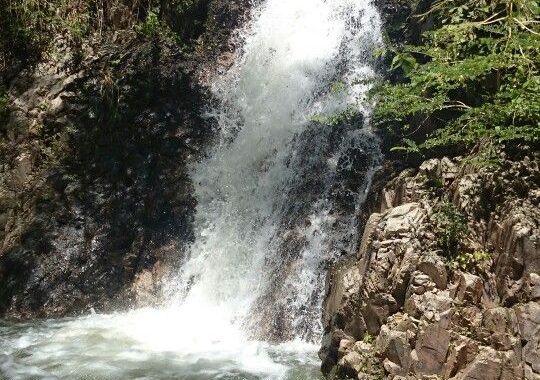I’m writing this in February, a very dry month in Costa Rica. It’s “summer” here, which is what
they call December through April because there is so little rain and the temperatures are a bit
higher.
For the rest of the year, there is rain. During a typical cycle, rains start in April and are pretty
tame until August. They usually get themselves organized later in the day, rinse off all the dust,
bring the wildlife to life.
From September through November, rains are the main events. The whole world gushes under
a daily deluge. Thunder and lighting provide celestial spectacles. Creeks and rivers rise, springs
spring, trickles turn into waterfalls, and frogs all think they’ve died and jumped to paradise!
According to Karl Kahler, writing in the Tico Times on October 3, 2015, if you total it all up,
“Costa Rica receives enough rain to supply an average of 22,000 gallons to each of its 5.1
million inhabitants every day. That’s a lot of water — enough to supply every person on the
planet with 15 gallons of water a day, year-round.”
So why is water such a big deal? Because the collection and distribution of the water has to be
managed, or it all ends up in the ocean where it doesn’t do you much good when you want to
brush your teeth at night.
For many years the laws have stated that for residential purposes, it’s not enough to just have
water. It has to be “authorized” water. There are only three sources of authorized water: 1. The
federal government’s AyA* water system, available mostly in cities and towns; 2. A registered
neighborhood or community ASADA** water system, available in many rural communities; 3. A
legally obtained concession allowing you to use a spring, creek, well, or river for your water
source.
The law has been that without one of those three sources of water, you cannot get a building
permit. Unfortunately, this law hasn’t been enforced with any regularity and many building
permits were granted without authorized water. Many people bought land with the
expectation that water wouldn’t be an issue when the time came to build.
Oooops. In the past few years, the first one municipality, then another, then another began to crack
down and enforce the law. They began to demand documentation before issuing a permit.
Imagine the irony: This has left many land owners huddled under big umbrellas by roaring
creeks in gushing rains unable to sell their land or build because they have no authorized water.
There is a lot more that could be said about this. It remains to be seen how it will all get
resolved, because many people are affected: owners, attorneys who specialize in real estate,
municipalities that lose revenue from building permits, architects, contractors, and of course
real estate agents.
In the meantime, be aware of the issue. If you are looking at buying undeveloped land, always
ask, “What about the water situation?” If the answer is that the property has water, ask for
documentation before you make an offer, because having water isn’t the same thing as having
water rights, right?
If the answer is that the water authorization is in the process, be skeptical about promises
regarding the timing. It can take two years to get a concession, and sometimes more to hook up
to an existing system if the property you are looking at wasn’t included as part of the system.
The one answer you should never accept is, “Don’t worry about it; it will all work out.” That was
true for many years, but it is no longer a good answer. No trustworthy agent these days will
encourage you to move forward on the basis of “thoughts and prayers” when it comes to water
rights.
In the meantime, consider coming to see Costa Rica during the heavy rainy season,
euphemistically referred to here as “green season” as opposed to “the season when sometimes
you can’t tell if that’s rain or if someone is emptying their pool on your head.”
We who live here love the rains. So do the flora and fauna, and so will you.
*AyA is short for Instituto Costarricense de Acueductos y Alcantarillados, roughly meaning “Costa Rican Institute for water
delivery and sewers.”
**ASADA is short for Asociaciones Administradoras de Los Sistemas de Acueductos y Alcantarillados, roughly translated as
“administrative associations for water delivery and sewers.”
-By Ron Snell.






